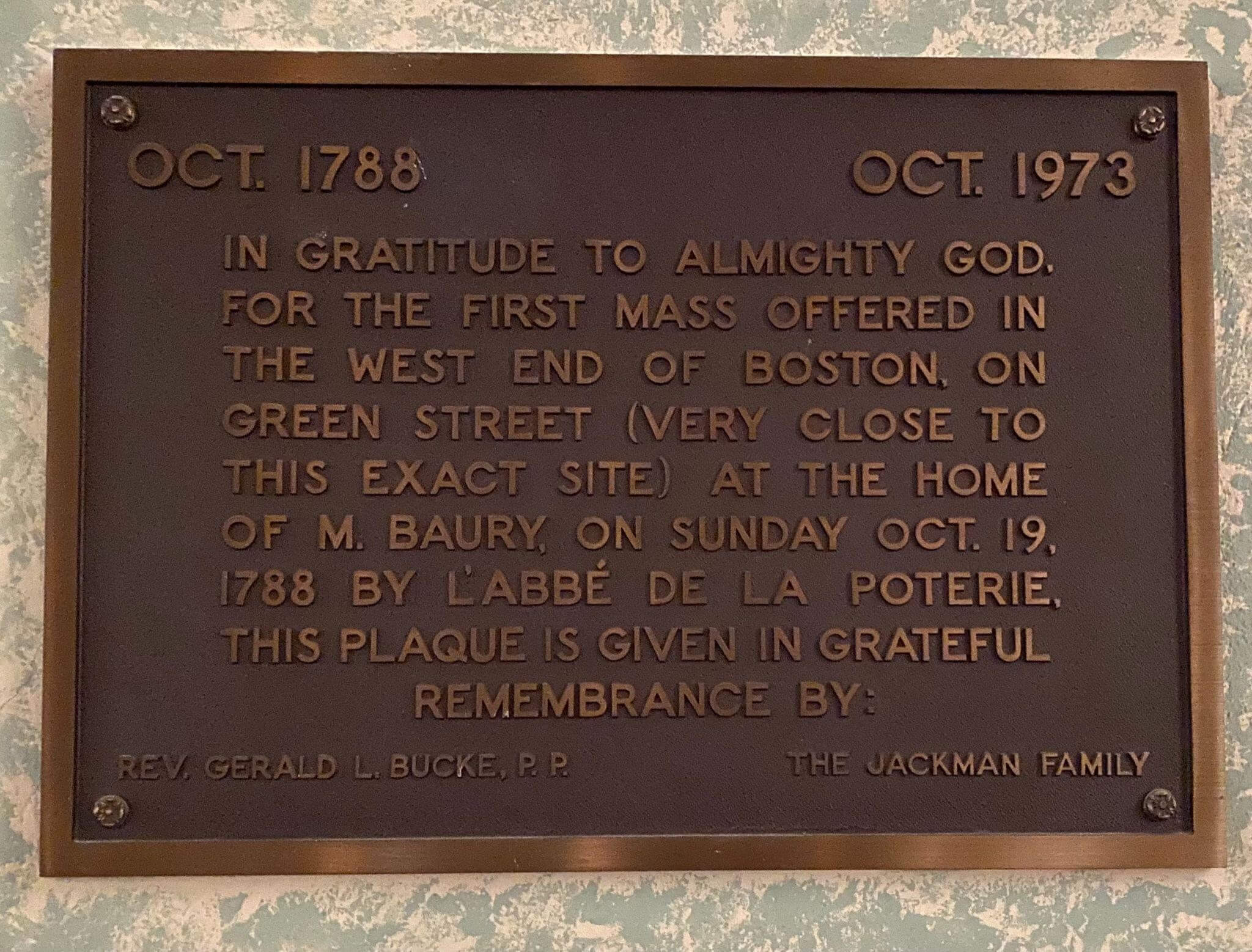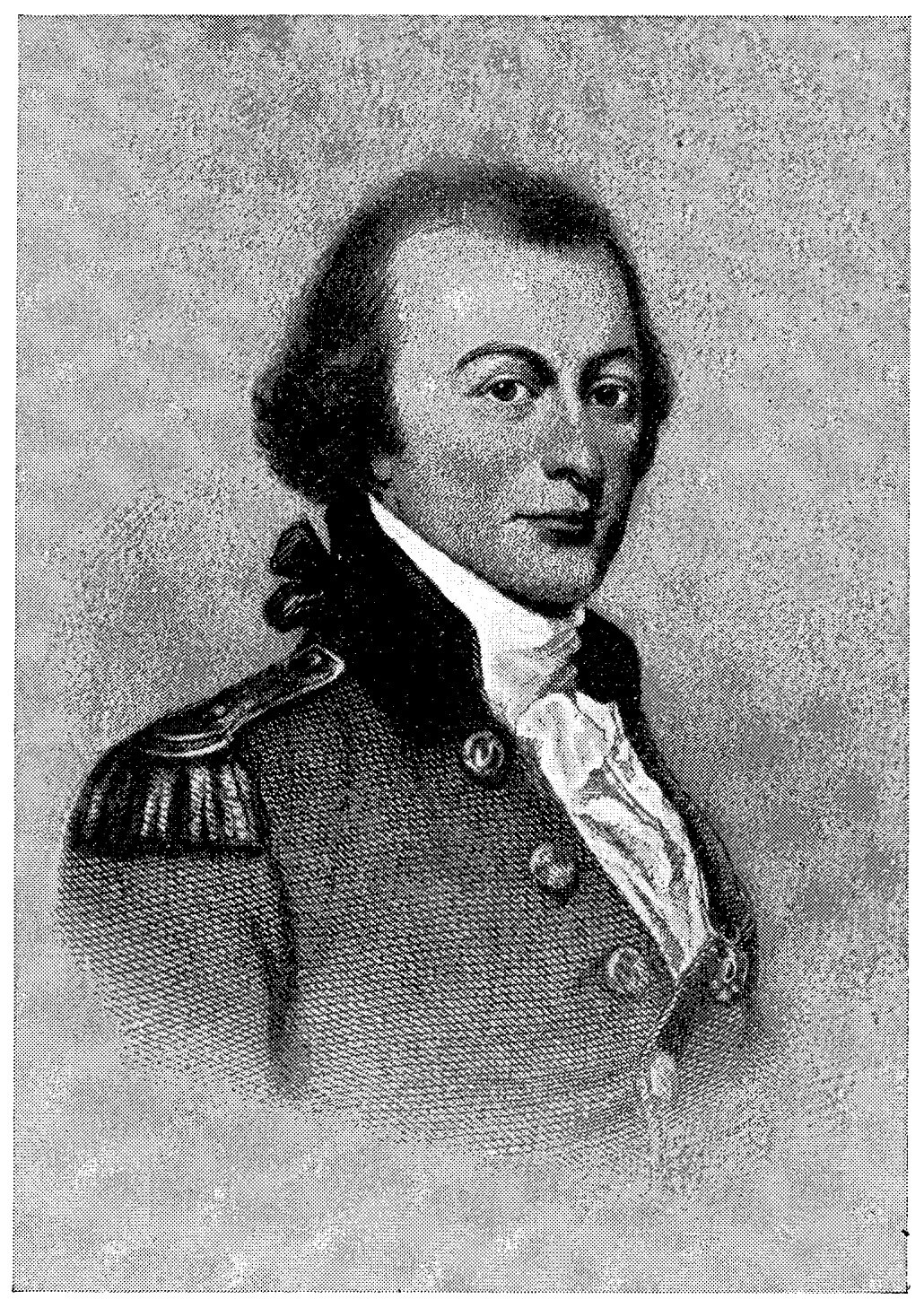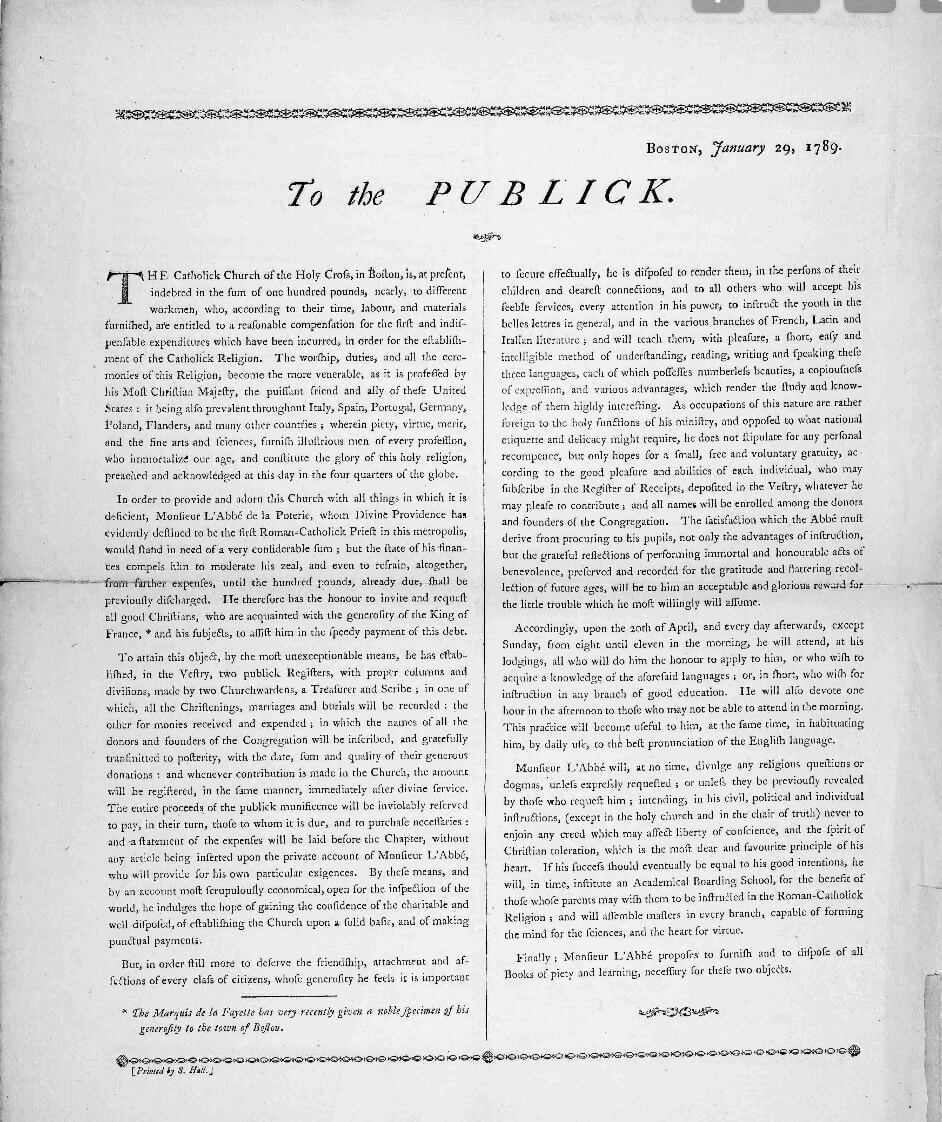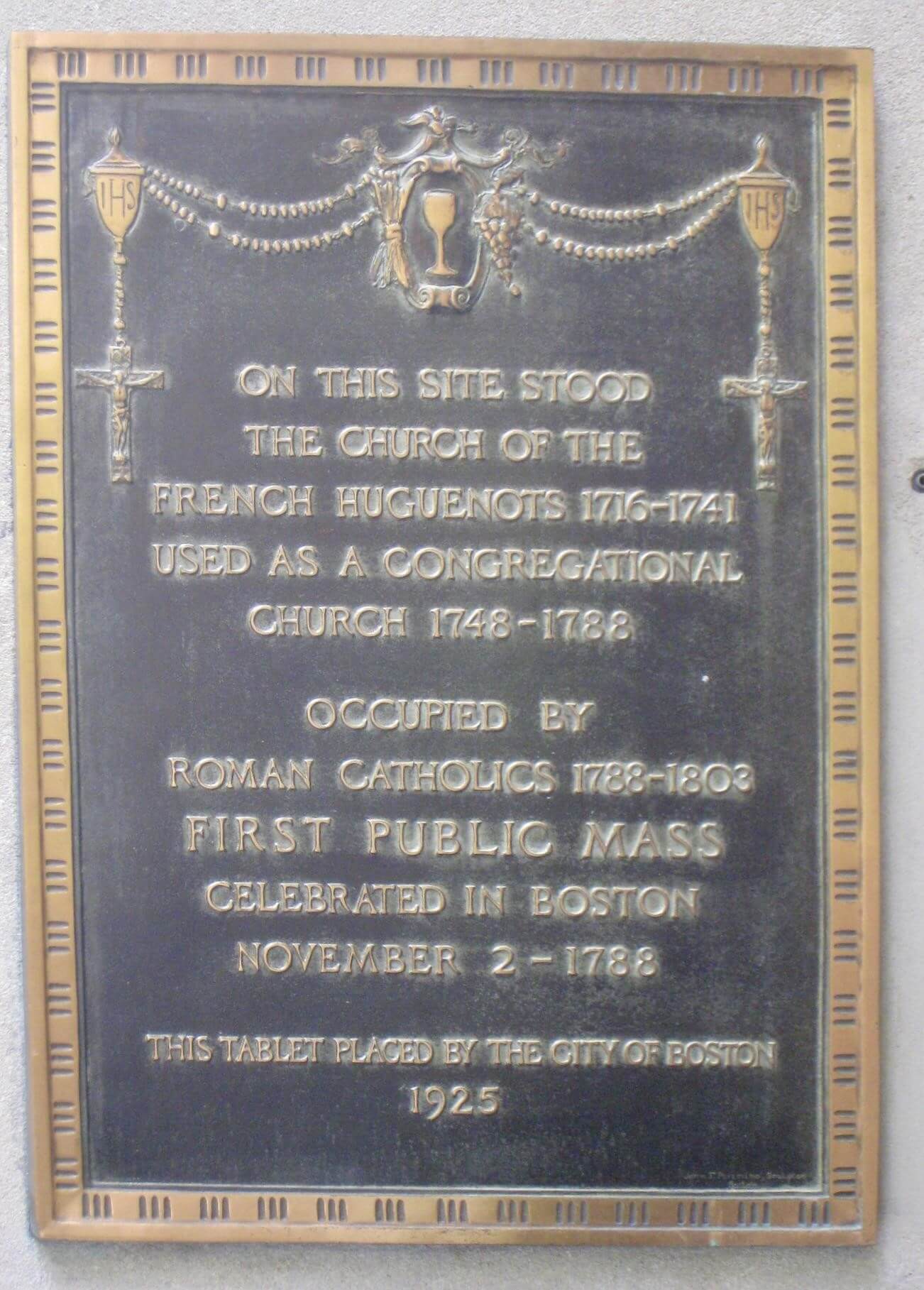The West End Hosts the First Catholic Service in Boston
After centuries of exclusion by Boston’s ruling Puritan leaders, Roman Catholics were finally allowed to officially practice their faith in Massachusetts in 1780. Led by French Catholics, the movement to establish a Catholic community in Boston is reported to have started with a private mass in the West End. This was the first step in establishing what would become one of the most recognized Catholic archdiocese in America.
To the right of the main altar of St. Joseph’s Church in the West End is a bronze plaque which states:
IN GRATITUDE TO ALMIGHTY GOD, FOR THE FIRST MASS OFFERED IN THE WEST END OF BOSTON, ON GREEN STREET (VERY CLOSE TO THIS EXACT SITE) AT THE HOME OF M. BAURY, ON SUNDAY, OCTOBER 19, 1788 BY L’ABBE DE POTERIE.
According to the Colonial Society and other sources, this private service in the West End took place before the same Abbé Claude Florent Bouchard de la Poterie who said the first public Catholic mass on November 2, 1788 at a “former French Protestant Church located on School Street,” which had been leased by a group of French and Irish Catholics then living in Boston.
The story of the founding of the Catholic Church in Boston began in 1780, when the Massachusetts Constitution first allowed the legal practice of the religion. Prior to this legislation, religious practice in the city was heavily restricted. Boston’s Puritan leaders enforced restrictions through the banishment, and even execution, of practitioners of unsanctioned beliefs, such as Catholics and Quakers. With the onset of the Revolutionary War, and the subsequent Colonial alliance with predominantly Catholic France, came a softening of public opinion towards Catholicism in Boston and ultimately its legalization. Even after the practice of Catholicism was technically allowed in the Commonwealth, it still took almost a decade for followers of the faith to organize. With the mass immigration of Irish Catholics to Boston yet to emerge, it was left to French Catholics in the area to lay the foundation for what would become the Archdiocese of Boston.
The hosts of the reported first Catholic service in the West End were Frenchman Louis Baury de Bellerive (1753-1807) and his American wife, Mary Clark (1767-1856). Louis was born to a military family in the French West Indies and was sent for schooling and military training in France. Upon completion of his education in 1773, he returned to his birthplace of Fort Dauphin, Saint-Domingue as a lieutenant, and by 1779 had been appointed Captain Commandant in the Corps of Chasseurs of San Domingo. In 1781, Louis was sent to Savannah as part of the French expeditionary force assisting the Americans in their fight against the British, and he remained in America after the war’s end. Louis became a citizen of Boston and was an original founding member of the Society of the Cincinnati, a prestigious veteran’s organization led by General George Washington. While in Boston, Louis met his future wife Mary Clark, who was born in Connecticut to Elisha Clark and Sarah Hall Clark, and was the granddaughter of Hugh Hall, a Boston merchant involved in the West Indies trade of goods and slaves. The Baury family split time between their home in Boston and a plantation they owned in the French West Indies. Louis continued his military career, seeing action in Shay’s Rebellion, the French Revolution (in the West Indies), and the Haitian Revolution, from which his wife Mary and their children barely escaped with their lives.
The official of the mass on Green Street, Abbé Claude Florent Bouchard de la Poterie, was a former chaplain in the French Navy who is said to have served with the French fleet in the French West Indies. He arrived in Boston most likely with the fleet that “under command of the Marquis de Sainneville, arrived off Boston harbor August 22, 1788, having sailed from Cape Francais, Haiti, on August 2.” It is possible that he had previously crossed paths with Baury while in the French Indies, which helps explain the choice of the Baury’s home as the site of the private mass. The Abbe, who was a lay minister, not an ordained priest, was allegedly “dismissed from the French fleet in disgrace,” according to Boston Protestant clergyman Jerome Belknap, and he was in need of a new station in Boston. Eventually, he was granted permission to serve Boston Catholics by John Carroll of Baltimore, the first American bishop and Prefect Apostolic of the Catholic Church in the United States. Soon after saying Mass at the Baury’s, the Abbe’ presided over the aforementioned first public mass at 24 School Street, as reported in the Boston Gazette of November 3, 1788. The troubled Abbe’s stay in Boston was short-lived, however, as he was suspended by Carroll in 1790 due to a case of financial malfeasance – his clerk allegedly stole donations earmarked for church repairs – and a damning letter sent to Boston parishioners from the Archbishop of Paris “telling them to beware of a certain Abbe Poterie who was somewhere in America.” The Abbe’ left Boston in disgrace and headed to Pennsylvania.
Unfortunately, there is little else known of Louis and Mary Baury’s time in the West End other than the story of the mass at their Green Street home, and an entry in the Boston Directory for 1789 which mentions a “Bellerive de Beaury, gentleman, near Philips’s rope walk.” After Louis’ death in 1807, Mary is mentioned in a legal petition she made to win her husband’s pension that he was due for his service during the Revolution. The couple is also mentioned in D.E. Baker’s “Historical Sketch of the Lucy Jackson Chapter House: D.A.R.”, which details the Baury’s past ownership of said house in Newton, MA, which served as a headquarters for the local branch of the Daughters of the American Revolution.
Article by Bob Potenza, edited by Sebastian Belfanti
Sources:
https://www.bostoncatholic.org/historical-sketch-archdiocese-boston/building-church-boston; http://civilwarthosesurnames.blogspot.com/2009/07/louis-baury-de-bellerive.html?m=1; https://www.colonialsociety.org/node/2802; https://www.forgottenbooks.com/en/download/HistoricalSketchoftheLucyJacksonChapterHouseDAR_10748105.pdf; https://www.logcollegepress.com/andr-le-mercier-16921764; https://www.masshist.org/collection-guides/view/fa0328; https://www.masshist.org/database/viewer.php?item_id=3565&pid=3; O’Donnell,Catherine. “John Carroll and the Origins of an American Catholic Church”, 1783–1815. The William and Mary Quarterly, 68(1), 101–126. https://doi.org/10.5309/willmaryquar.68.1.0101;











